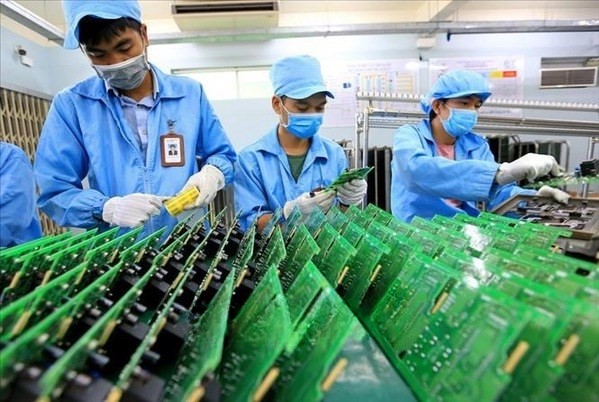
|
Getting your Trinity Audio player ready...
|
The Ministry of Information and Communications (MIC) envisions a promising trajectory for Vietnam’s semiconductor industry, forecasting a valuation of US$20-30 billion by 2030. However, the current landscape reveals a stark reality: only two local firms, FPT and Viettel, have ventured into this domain in its infancy, despite over 50 eligible companies in the country.

Policymakers are keenly aware of Vietnam’s potential in the global semiconductor chip map, acknowledging its abundant resources for the industry. However, the national semiconductor ecosystem lacks manufacturing facilities, with only packaging and testing factories established by international giants.
Given these fundamental issues, the road ahead is paved with challenges, including the relevant talent. To secure a significant position in the semiconductor arena, Vietnam must address its shortage of skilled semiconductor integrated circuit (IC) engineers. The MIC emphasises the need for at least 50,000 IC engineers by 2030, a tenfold increase from the current workforce.
Minister of Education and Training Nguyen Kim Son underscores the pivotal role of tertiary institutions in meeting this demand. Currently, 35 universities offer courses related to semiconductor ICs, with plans to enrol over 1,000 students specifically for chip designing next year. Despite ambitious enrollment targets, concerns linger regarding the frequency of engineer training cycles. Nguyen Thien Nghia of the MIC highlights the urgency of training engineers more rapidly to seize opportunities in the semiconductor industry.
Recognising the strategic importance of semiconductor chip development, the Government has prioritised quality human resource strategies and assigned relevant ministries to formulate cohesive development policies. Since 2010, semiconductor chip products have been deemed national strategic products, although substantial investments are yet to materialise. The Ministry of Science and Technology (MoST) is actively engaged in semiconductor chip research, design, and manufacturing initiatives.
Dam Bach Duong, Director of the High Technology Department at MoST, underscores the need for specialised policies to support semiconductor chip manufacturing. Currently, development policies for this industry lack consistency, necessitating collaborative efforts among ministries and sectors to introduce coherent policies.
Despite the inherent challenges, experts believe that Vietnam has a window of opportunity to prepare for the semiconductor industry’s emergence. Global semiconductor leaders, such as the US and Japan, are eager to support Vietnam’s foray into this market. With the Government’s commitment to digital transformation, domestic demand for electronic devices and IoT-connected devices is set to surge.
In line with these ambitions, Vietnam is taking significant strides to bolster its semiconductor industry, with pledges of tax breaks and incentives for companies contributing to sector development. Minister of Science and Technology Huynh Thanh Dat outlined plans for industry grants and joint state-private research collaborations to propel chip manufacturing forward.
While major players eye expansion in Vietnam, the country stands to benefit from investments under the US CHIPS and Science Act, alongside hosting a chip giant’s largest global test and assembly facility.
U.S. Undersecretary of State Jose Fernandez highlighted Vietnam’s appeal to semiconductor companies, contingent on its renewable energy capacity meeting industry demands. Technology transfer agreements with chip sector leaders are vital for Vietnam’s growth trajectory, prompting policy enhancements to attract foreign expertise.
Collaborations between universities and industry giants aim to address skill shortages and prepare 50,000 engineers for the semiconductor industry by 2030.
Fernandez emphasised Vietnam’s importance in the US CHIPS Act subsidies, reflecting confidence in the country’s potential. The subsidy amount, to be determined soon, is poised to accelerate Vietnam’s semiconductor ambitions and solidify its position as a key player in the global electronics supply chain.
By fostering a conducive environment for semiconductor development, Vietnam can leverage its engineering talent to design and manufacture chips for telecommunications products, thereby shaping its future trajectory in the semiconductor landscape.
















